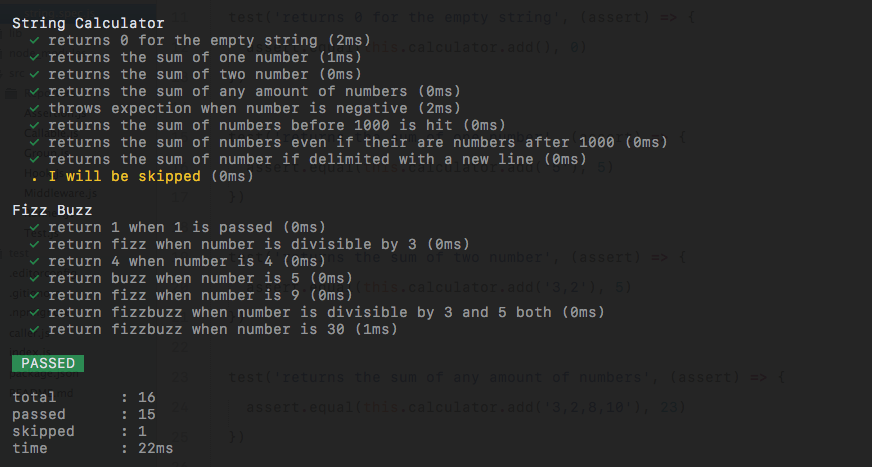
Japa is a batteries included minimal testing framework for Node.Js. Japa does not have any cli to run your tests, infact running the test file as a node script will execute the tests for you (quite similar to tape).
Installation
Japa needs Node.js >= 6.0.0.
npm i --save japa
Why Japa?
Below is the list of specific reasons to choose Japa over any other testing framework.
Minimal Core
Japa core is so minimal and only focuses on building your tests, not running them.
ES2015..2017 Friendly
Japa harness the goodness of ES2105 and later. You can define your tests as async methods or return a Promise from your tests.
Embedable
It comes with fully-fledged API, which can be used to build your own test runners.
Pretty Output
The default test reporter output is as pretty as Mocha spec reporter. Check below screenshot.

Human Readable Diff
Majority of test runners outputs assertions diff quite similar to GIT. Which is great when diffing code, but not when reading failing test reports. Japa has a simple and clean diff viewer.

Batteries Included
Japa minimal core does not limit the functionalities you get with it. It covers all the use cases of writing tests and offers explicit API's for them.
Multiple Test Formats
You can write your tests as async functions, return a Promise or make use of traditional done style callbacks
test('Async test', async (assert) => {
const result = await someTimeConsumingWork()
})
test('Returns promise', (assert) => {
return new Promise(() => {
})
})
test('Traditional callbacks', (assert, done) => {
fs.readFile(path, (error, contents) => {
if(error) {
return done(error)
}
assert.equal(contents, 'All good')
done()
})
})
Assertions Planning
At times your test passes, since the failing code is not reachable by your test files. It is always a good idea
to plan assertions to these kind of scanerios.
const test = require('japa')
test('Planning assertions', async (assert) => {
assert.plan(2)
const users = await User.all()
assert.isArray(users)
assert.deepEqual(users[0], { username: '...' })
})
Timeouts
You can define timeout for each test when defining them.
const test = require('japa')
test('This is the slow one', (assert) => {
}).timeout(5000)
Retry Flaky Tests
We all deal with flaky tests, which needs to be retried couple of times before they can pass.
The below test will run for 4 times (3 retries + 1 original run cycle) before failing.
const test = require('japa')
test('I am so flaky', (assert) => {
}).retry(3)
Skip Tests
Got a bug that needs some love? Skip it's tests until it get's fixed.
const test = require('japa')
test.skip('I will be skipped', (assert) => {
})
Failing/Regression Tests
When bugs spotted, your users can create a PR with failing test instead of creating issues. Tests started with failing will not break the test suite.
const test = require('japa')
test.failing('Some regression here', (assert) => {
assert.fail(2, 4, 'Expected 2 to be equal to 2 but got 4')
})

Grouping Tests
It is a good practice to keep your tests flat and not be depedented on any global state. But at times you may want to execute cleanup/setup methods before and after tests.
It is a good idea to group tests and perform clean tasks inside life cycle hooks.
before
Will run before all the tests in the group.
const test = require('japa')
test.group('Some Module', (group) => {
group.before(async () => {
})
})
beforeEach
Will run before each test in the group.
const test = require('japa')
test.group('Some Module', (group) => {
group.beforeEach(async () => {
})
})
after
Will run after all the tests in the group.
const test = require('japa')
test.group('Some Module', (group) => {
group.after(async () => {
})
})
afterEach
Will run after each test in the group.
const test = require('japa')
test.group('Some Module', (group) => {
group.afterEach(async () => {
})
})
Globals
Below is the list of settings/options which can turn on/off globally.
bail
Test suite doesn't stop on test failures and continue to run. The bail method can be used to stop executing the test after first failure.
const test = require('japa')
test.bail(true)
test('title', () => {
})
timeout
Instead of defining timeout for each test, you can define them once for all tests.
const test = require('japa')
test.timeout(5000)
test('title', () => {
})
use
Japa makes use of the list reporter bundled with the core. You can attach your own reporter by making use of the use method.
const test = require('japa')
test.use(function (emitter) {
emitter.on('test:end', console.log)
})
test('title', () => {
})
Assertion
Japa makes use of ChaiJs Assertion Library. Make sure to read their docs.
API
Here is the list of all the testing methods
test(title, callback)
Write a new test
test('title', (assert) => {})
test.skip(title, callback)
Create a test to be skipped
test.skip('title', (assert) => {})
test.failing(title, callback)
Create a test which is expected to be failed
test.failing('title', (assert) => {})
timeout(milliseconds)
How long to wait for test to finish.
test('title', (assert) => {
}).timeout(5000)
retry(ops)
How many times to retry a test before marking it as fail. The retry only happens when test keeps on failing
test('title', (assert) => {
}).retry(2)
group(title, callback)
Create a new test group/suite. Nested groups are not allowed.
test.group('Module name', (group) => {
group.after(async () => >{
await Db.clear()
})
})
grep(substring)
Filter and only run tests that contains the given substring.
test.grep('foo')
test('bar', () => {
console.log('Not executed')
})
test('foo', () => {
console.log('Executed')
})
Events
Below is the list of events, you can listen for when writing for your reporters.
You can grab the instance of emitter by import the following file
const emitter = require('japa/lib/emitter')
emitter.on('test:end', function (payload) {
})
group:start
Emitted whenever a new group has been started. It includes the following payload.
{
title: 'GROUP TITLE',
status: 'pending'
}
group:end
Emitted whenever all the tests inside a group have been executed. It includes the following payload.
{
title: 'GROUP TITLE',
status: 'failed | passed',
errors: [Array of errors for all failing tests]
}
test:start
Emitted whenever a new test starts.
{
title: 'TEST TITLE',
status: 'todo | skipped',
regression: 'true | false'
}
test:end
Emitted whenever a test ends.
{
title: 'TEST TITLE',
status: 'todo | skipped | failed | passed',
timeout: 'true | false',
error: 'Error if failed',
regression: 'true | false',
regressionMessage: 'Error message of regression test (if regression)'
}
hook:before:start
Emitted whenever before hook execution has started.
hook:before:end
Emitted whenever before hook execution has ended.
hook:beforeEach:start
Emitted whenever beforeEach hook execution has started.
hook:beforeEach:end
Emitted whenever beforeEach hook execution has ended.
hook:after:start
Emitted whenever after hook execution has started.
hook:after:end
Emitted whenever after hook execution has ended.
hook:afterEach:start
Emitted whenever afterEach hook execution has started.
hook:afterEach:end
Emitted whenever afterEach hook execution has ended.







